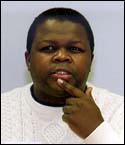Welcome to America, Vusi Kumalo
By Frank Clancy
VUSI KUMALO DESCRIBES IT AS "one of my first introductions to the cold weather in Minnesota." As an undergraduate at St. Cloud State University, he remembers, he was about to follow a woman through a door when she deliberately shut it in his face. Then she called him a "nigger," told him to "go back to where [he] came from," and spit in his face. Alas, it wasn't his only encounter with that hateful word.
Of that encounter he says he was left with three bad choices. He could go after the woman and confront her, but then he would be seen as the stereotypical aggressive black male. He could report her to the authorities and be seen as a troublemaker, a militant. Or finally he could just let it go, which allowed that kind of behavior to continue without being challenged.
A St. Cloud resident since 1990, Kumalo, 39, grew up in South Africa under apartheid. Today he works as the Director of Multicultural Services at St. Cloud Technical College. The experience of being a person of color in overwhelmingly white out-state Minnesota, he says, "has been a challenge, to say the least."
To some extent, Kumalo is treated better now because more people know him. But he doesn't think the overall situation has improved. As a person of color, Kumalo feels like he is constantly being scrutinized; he is never anonymous.
Last summer, a St. Cloud policeman stopped Kumalo at
the entrance to his apartment parking lot, ostensibly for speeding - an
obvious pretext, Kumalo says, since he had been following a car that was
turning as the police car drove past. After harassing Kumalo - the cop
suggested, for example, that he change his name - the policeman let him go.
"I'm going to be nice to you, and give you a warning ticket," he told
Kumalo. "Welcome to America." Then, Kumalo recalls, "he laughed and walked away."
Ironically, Kumalo was just returning home, tired and suffering from jet lag, after a visit to South Africa. "I fit a profile," Kumalo says. "Being black and male, already I've committed a crime without knowing what I've done. "
To escape, Kumalo goes to the Twin Cities almost every weekend, where he spends time with other blacks. "Some people go to the country to relax, " he says. "I go into the city."
For Kumalo, education is crucial. "Education without diversity is an incomplete education," he says. "We're making people educated weaklings. "
"White Americans need to understand that they have privileges I don't. Being black, I don't have those same privileges. All I need to do is show up: I know that I don't belong."
By Frank Clancy
VUSI KUMALO DESCRIBES IT AS "one of my first introductions to the cold weather in Minnesota." As an undergraduate at St. Cloud State University, he remembers, he was about to follow a woman through a door when she deliberately shut it in his face. Then she called him a "nigger," told him to "go back to where [he] came from," and spit in his face. Alas, it wasn't his only encounter with that hateful word.

|
| Vusi Kumalo (Photo: Neil Anderson ) |
A St. Cloud resident since 1990, Kumalo, 39, grew up in South Africa under apartheid. Today he works as the Director of Multicultural Services at St. Cloud Technical College. The experience of being a person of color in overwhelmingly white out-state Minnesota, he says, "has been a challenge, to say the least."
To some extent, Kumalo is treated better now because more people know him. But he doesn't think the overall situation has improved. As a person of color, Kumalo feels like he is constantly being scrutinized; he is never anonymous.
|
"Being black and male, already I've committed a crime without
knowing what I've done."
- Vusi Kumalo |
Ironically, Kumalo was just returning home, tired and suffering from jet lag, after a visit to South Africa. "I fit a profile," Kumalo says. "Being black and male, already I've committed a crime without knowing what I've done. "
To escape, Kumalo goes to the Twin Cities almost every weekend, where he spends time with other blacks. "Some people go to the country to relax, " he says. "I go into the city."
For Kumalo, education is crucial. "Education without diversity is an incomplete education," he says. "We're making people educated weaklings. "
"White Americans need to understand that they have privileges I don't. Being black, I don't have those same privileges. All I need to do is show up: I know that I don't belong."
